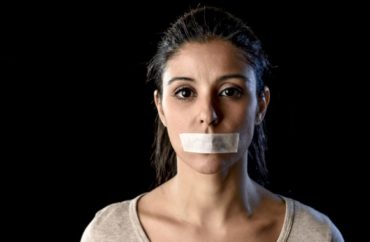
Majority of students opposed to bringing conservative speakers on campus, report found
College students at America’s largest 203 colleges continue to censor themselves inside and outside of the classroom, a national survey of 45,000 students concluded.
Students play a significant role in censoring free speech on campus, but colleges can enforce policies that protect it, according to the Foundation for Individual Rights and Expression’s third annual College Free Speech Rankings, released in September, for the 2022-23 school year.
Adam Goldstein, FIRE’s vice president of research, told The College Fix in an email on December 16 that the wider culture has contributed to an atmosphere of thought and speech suppression on campus, measured by the report.
“To the extent there are clues in the existing data, cultural forces in the general public seem to create more discomfort than just on-campus interactions.” Goldstein stated. “For example, 41% of students were uncomfortable disagreeing with a professor in a written assignment, but 59% were uncomfortable disagreeing publicly.”
“Similarly, 48% of students were uncomfortable expressing their views on a controversial political topic on campus, while 60% were uncomfortable expressing unpopular opinions to fellow students on social media,” Goldstein stated.
However, Goldstein told the Fix that when it comes to students engaging in at least some forms of censorship, schools can play a big role in protecting free speech by enforcing policies against violent or disruptive tactics.
“Lots of campus censorship isn’t expressive, such as theft of newspapers, ongoing heckler’s vetoes that prevent speakers from speaking entirely, or trashing flyers from ideologically opposed campus groups,” he wrote. “To the extent campus policy or existing law prohibit those actions, enforcement is important. A policy is only ever as good as the will to enforce it.”
Columbia University ranked lowest, receiving a score of ‘Abysmal’
FIRE’s lowest-ranked school for free speech “by far” was Columbia University, with a score of “Abysmal,” according to the report summary. University of Chicago ranked highest for the second time in two years. Other lowest-ranking schools included Skidmore College, Georgetown and the University of Pennsylvania.
FIRE calculated free speech scores for each school based on seven components, according to its rankings page. These included student openness to discussing challenging topics, tolerance for controversial speakers, students’ admission of whether they have withheld ideas out of fear and evaluation of written free speech policies.
The analysis includes the “largest survey on student free expression ever conducted” and “adds 45,000 student voices to the national conversation about free speech on college campuses,” according to a news release.
The report was completed in partnership with College Pulse, a marketing and research firm.
The Fix asked Goldstein whether the censorship it measured originated with student demands or administrative or faculty control.
“It’s tough to say, really, because it’s a chicken-and-egg problem” Goldstein stated. “Some students demand censorship, and schools occasionally justify their policies by saying the students demanded it.”
“Opposition to allowing controversial conservative speakers on campus ranged from 59% to 73% of the students surveyed, depending on the speaker,” according to the report. “In contrast, opposition to controversial liberal speakers ranged from 24% to 41%, depending on the speaker.”
Additionally, “more than three-in-five students (62%) said that students shouting down a speaker to prevent them from speaking on campus was acceptable to some degree, down from 66% in 2021, and one-in-five (20%) said this about using violence to stop a campus speech, down from 23% in 2021,” the report stated.
Nonetheless, “large numbers of students demanding censorship is a relatively young phenomenon—not more than a decade old, really—whereas schools have been censoring student speech as long as they’ve existed.” Goldstein stated. “So I’m somewhat skeptical of the schools who say they had to censor something because students complained.”
Report indicates high rates of self-censorship
Additionally, high numbers of students are censoring themselves, according to the report. Forty-two percent conservative students felt that they could not express their opinions freely, versus 13 percent of of liberal students who said the same. Sixty-three percent of respondents worried about damaging their reputation because someone misunderstood something they said or did.
Abortion, racial inequality, and COVID-19 vaccine mandates were rated as the three most difficult topics to discuss on campus, the report stated. Additionally 40 percent of students said they are are uncomfortable disagreeing with a professor.
“That so many students are self-silencing and silencing each other is an indictment of campus culture,” FIRE Senior Research Fellow Sean Stevens stated in the report news release. “How can students develop their distinct voices and ideas in college if they’re too afraid to engage with each other?”
MORE: Next Harvard prez must stand up for free speech, say student, faculty and alumni
IMAGE: Marcos Mesa Sam Wordley/Shutterstock
Like The College Fix on Facebook / Follow us on Twitter





Please join the conversation about our stories on Facebook, Twitter, Instagram, Reddit, MeWe, Rumble, Gab, Minds and Gettr.